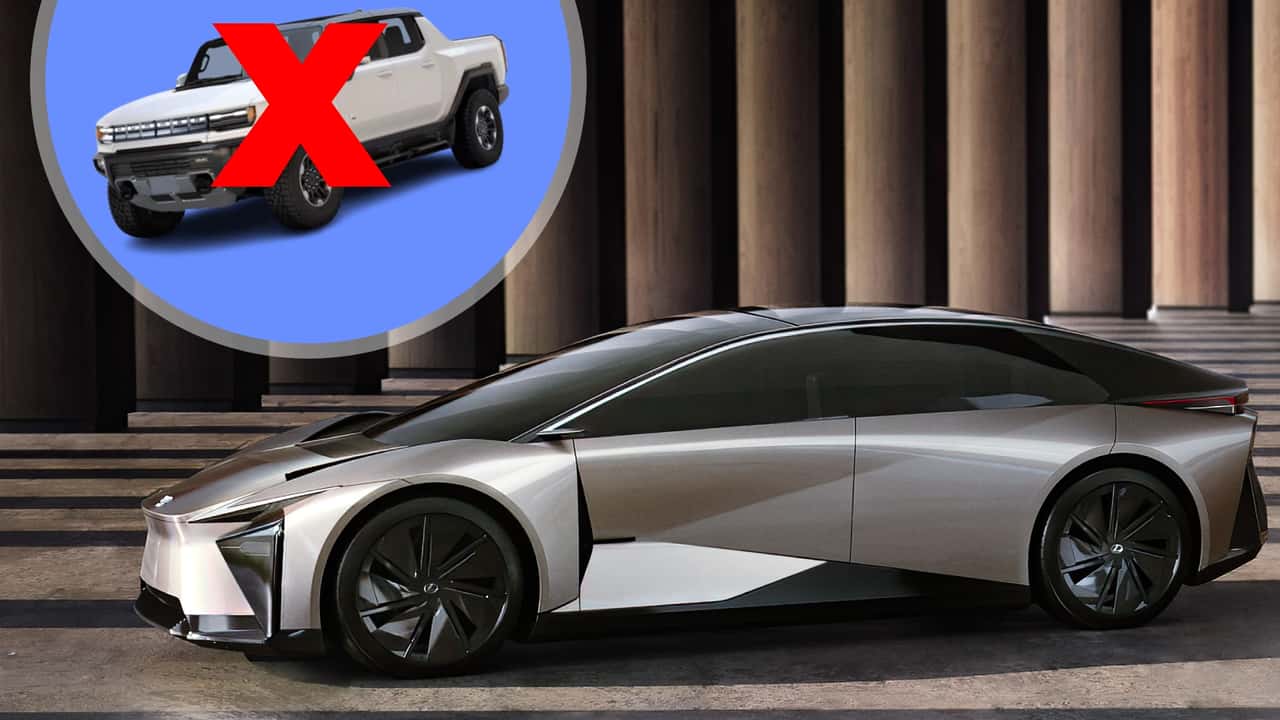The Lexus LF-ZC Concept, showcased at the Japan Mobility Show, is a groundbreaking electric vehicle set to be released in 2026. It will be the first EV to utilize a brand-new Toyota platform and will boast impressive features such as advanced steer-by-wire technology and a rumored electric range of 620 miles.
Contrary to popular belief, the LF-ZC will not rely on a massive battery pack to achieve its impressive range. Instead, it will rely on innovative chemistry to deliver on its claims. Toyota recently presented its battery development strategy, which includes the use of next-generation prismatic lithium-ion batteries with double the range of current models and a 20% reduction in cost. These batteries will also have a fast-charging capability, reaching 80% in just 20 minutes. They are set to launch in 2026 and will come in two pack sizes for different vehicle types.
Toyota is also planning to introduce lithium-iron-phosphate (LFP) batteries that offer 20% better range than the current models and a 40% cost reduction. These batteries will be cheaper to produce and will also have a fast-charging time of 30 minutes. The LFP batteries are expected to launch in 2026 and 2027.
Furthermore, Toyota has its sights set on solid-state batteries, which promise even greater range and faster charging times. The company aims to achieve a 20% improvement in range over the performance lithium-ion batteries and a 10-minute fast-charging time. Additionally, Toyota is working towards developing solid-state batteries that have 50% better range than the performance lithium-ion batteries. The timeline for commercial use of these batteries is estimated to be 2027 or 2028.
To achieve its ambitious range goals, Toyota will focus on reducing the size of various components within the vehicle. By minimizing core components such as the steering system and HVAC unit, engineers can create more interior space and accommodate flatter, thinner batteries with higher energy density. The LF-ZC will also be the first Toyota EV to utilize gigacasting and self-driving technology during production, enabling faster and more efficient assembly.
Although Toyota acknowledges that it needs to catch up in the EV market, the company is confident in its ability to deliver innovative and competitive electric vehicles. Executives and engineers believe that the pace of development and market adoption is accelerating, and they are determined not to be left behind in the EV race.
Overall, the Lexus LF-ZC Concept showcases Toyota’s commitment to pushing the boundaries of electric vehicle technology and its dedication to creating sustainable and efficient transportation solutions for the future.
Toyota’s Electric Vehicles Target Victory Through 620 Miles of Range, Minimizing Battery Size
The automotive industry is currently undergoing a paradigm shift towards electric vehicles (EVs) as a means to reduce carbon emissions and create a sustainable future. As major car manufacturers compete to develop electric vehicles with longer ranges and smaller batteries, Toyota has emerged as a frontrunner in the race to create highly efficient and practical EVs.
One of the key challenges in EV development lies in balancing the trade-off between range and battery size. Larger batteries with greater energy capacities typically provide longer driving ranges, but at the cost of increased weight and size, resulting in reduced efficiency and higher manufacturing costs. Recognizing this dilemma, Toyota is addressing the issue head-on by adopting innovative technology, engineered to maximize efficiency and minimize battery size while maintaining impressive driving ranges.
Toyota’s latest breakthrough involves utilizing solid-state lithium-ion batteries, a cutting-edge technology that promises to revolutionize the EV industry. Unlike conventional liquid-based lithium-ion batteries, solid-state batteries employ solid electrolytes which offer greater safety, higher energy density, and faster charging capabilities. This technology translates into Toyota’s EVs achieving significantly improved ranges, surpassing the monumental milestone of 620 miles (approximately 1,000 kilometers) on a single charge.
The ability to reach such substantial driving ranges with minimized battery size is a huge leap forward in EV development. Toyota’s achievement not only eliminates the range anxiety that often plagues EV owners, but it also enables a more compact and lightweight vehicle design, enhancing overall driving dynamics and improving energy efficiency.
By reducing battery size while maintaining an impressive range, Toyota is tackling another major challenge faced by the EV industry – affordability. Battery costs have historically been one of the biggest obstacles in widespread EV adoption, contributing to their higher price tags compared to conventional internal combustion engine vehicles. However, Toyota’s commitment to reducing battery size enables significant manufacturing cost savings, enabling them to offer high-range EVs at more competitive price points, thus making them a more accessible choice for consumers.
Toyota’s dedication to the development of efficient EVs extends beyond its technological advancements. The Japanese manufacturer also recognizes the importance of infrastructure development to support the growth of EVs. Toyota is actively collaborating with various stakeholders, including governments, utility companies, and charging infrastructure providers, to establish a comprehensive charging network that will ensure the seamless integration of EVs into society.
In conclusion, Toyota’s pursuit of victory in the EV market through its 620-mile range EVs with minimized battery size showcases the company’s commitment to sustainable and affordable transportation. By leveraging solid-state battery technology and prioritizing efficient design, Toyota aims to revolutionize the EV industry and reshape the future of mobility. As the world transitions towards a more sustainable transportation ecosystem, Toyota’s relentless innovation places them at the forefront of this transformation.

